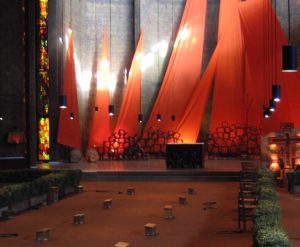It was late at night for the phone to be ringing, but when I picked up, I knew it was for a good reason. My good friend, Sara, whom I had met at an interfaith dialogue (IFD) the year before, was upset because some of my Protestant sisters and brothers had recently made an explicit conversion attempt on her Mormon soul. After multiple years of building a relationship with her, they had decided it was time to express concern for her presumably condemned eternity. Instead of adding to the sum of souls saved for Jesus, the result was this late night phone call to me, and an unwanted new sense of distance between her and her other Evangelical friends.
Dr. McConnell’s Missional Principals of Interfaith Dialogue sheds light on why this scenario went all wrong for Sara’s well-meaning Protestant friends. As God was present with Dr. McConnell as he sipped chai in Northern Uganda, God has also been present when I have sipped my Starbucks chai in Los Angeles across the table from Sara. In addition to the similarity of friendship transpiring over hot drinks, both Dr. McConnell and I also accidentally found ourselves transformed by the interfaith listening process. God spoke into a conversation that occurred by the entrance into someone else’s world of faith.
The implication of God’s transforming presence in an IFD is that it inspires more and more conversations to happen, not necessarily with the intent of conversion, but with the acknowledgment that God is changing more than just the “other” people at the table. Even though Sara felt trust had been betrayed between her and other Evangelical friends, she called me, another Evangelical, to talk about it.
This begs the question, “Is protecting the trust we’ve built more important than seeking conversion by explicit testimony of Evangelical understanding of truth?” Perhaps the question and its assumptions are even less helpful than my answering it would be, as the question implies that we have not followed McConnell’s recommendation that we enter fully into the world of the “other.” When we do fully enter into the world of the “other”, we meet our friends of other traditions where they are, and vice versa. This requires existing in tension, but it is discussed with natural compassion, rather than the ignoring or awkward references to such tensions when genuine pursuit of trust is absent.
Meeting people where they are is a beautiful reflection of how God meets us where we are, how He met us through the Incarnation, and continues to meet us today as He draws us ever closer to Him. It is additionally paramount to make sure this is not a foundation by which we presume to take on God’s very essence, but rather continuously pursue lives in light of Imago Dei. We should not forget that as Evangelicals, we do not believe we are divine but are rather made in the Divine image. Thus, we reflect His ways and His love in our lives, but we do not presume to touch, understand, or enact the work that only He can do.
Don’t get me wrong, I would love to see those other minds change. As McConnell outlines in dialogue guidelines #4 and 5, honesty about oneself is central to a successful interfaith dialogue. I wish everyone accepted Jesus Christ as her Lord and Savior, and I say so publicly among friends who might agree or not. This disposition is not a mystery to my dialogue partners.
We are never called to water down the Gospel. We are called to water seeds that have been planted before us, or at times to plant them in the first place. And in such endeavors, we must never forget that it is only God that can create such seeds, and it is only He who compels us to nurture them (1Cor 5:3-9). Conversion belongs to God. Changing people’s hearts belongs to God. We are indeed called into others’ worlds to demonstrate and discuss the way God loves His children. With God’s help, and only with God’s help, we can do so.
Through IFD, I have been enabled to enter into other’s worlds, and have my perception of my own faith challenged and sharpened in ways that could not occur in other contexts. I have seen understanding and peace grow between unlikely friends. Perhaps most significantly, God has met me through IFD when “the other” has entered into my world. The grace involved in this experience is transformative. We should never forget that God once met us where we were as our conversion began, and that He continues to meet us in unlikely ways and through people we might not guess He would use. Thus, it is not just others who should be wary of conversion in IFD; our God continues to draw us near to Him in new ways as we participate in conversations with those who believe differently than us.
Recently in my life, I have unequivocally stated that I am blessed by IFD. I will continue to do so. Imagine who else might one day say they have gotten closer to the love of Christ because of the many Evangelicals who have stood to say the same thing? Sara and I, late night phone calls and all, can both say that about our friendship. Thanks be to God.


